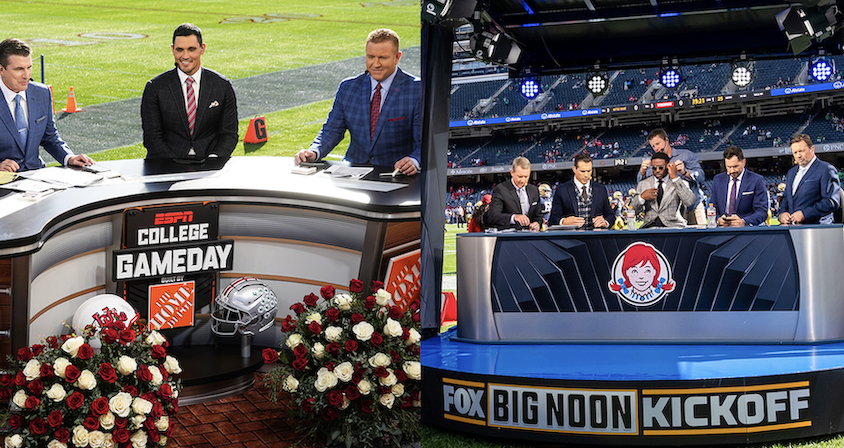In 2011, then-LSU Chancellor Michael Martin made a prediction for the future of college football. “I think we could ultimately end up with two conferences: one called ESPN and one called FOX.”
Twelve years later, the dueling networks have purchased all the best inventory and bankrolled the seismic shifts in realignment.
ESPN paid for Texas and Oklahoma’s jump to the SEC, while Fox funded Oregon and Washington’s move to the Big Ten and shelled out extra for USC and UCLA. (The two networks collaborated on paying for the Big 12’s future new members, too.)
For now, ESPN holds the media rights to most of the key conferences, airs dozens of bowls every postseason, and exclusively controls TV rights to the sport’s crown jewel: the College Football Playoff. But Fox is matching ESPN thanks to a new Big Ten contract and major shifts in programming.
Going forward, there will be the Big Ten and Fox and the SEC and ESPN — and then there’s everyone else.
The Rise of Two Empires
ESPN and Fox have operated as a cordial “college football duopoly,” Patrick Crakes, the ex-Fox Sports executive turned media consultant, told Front Office Sports.
The dynamic was decades in the making, from the 1984 Supreme Court decision breaking up the NCAA’s monopoly on college football rights, to the creation of conference TV networks in the early 2000s.
Conference networks “really lock in your partnership, even beyond the traditional rights cycles,” Octagon SVP of Global Media Rights Consulting, William Mao, told FOS. ESPN and Fox are the only two networks with these partnerships.
The duopoly solidified over the past few years, as the networks gained virtually complete control over the Big Ten and SEC.
Since the 1990s, CBS has owned some of the SEC’s top football content. But in 2020, the network relinquished that decades-old partnership of “SEC on CBS,” suggesting it had decided to focus on dominating in other sports.
“When we had the opportunity to secure the last remaining piece of the puzzle, we jumped at that,” ESPN SVP of College Sports Programming and Acquisitions Nick Dawson told FOS.
ESPN and ABC inked a landmark 10-year, $3 billion package with the SEC. The deal, which starts in 2024, will put every single SEC sport on an ESPN network.
A year later, the SEC announced the additions of Texas and Oklahoma — a move that even commissioner Greg Sankey heralded as creating a “super conference.” ESPN was contractually obligated to pay around $21 million for each school per year.
It wasn’t long, though, before Fox secured a super conference of its own.
In 2022, the Big Ten announced it would welcome West Coast titans UCLA and USC amid negotiations for a new media rights package.
During negotiations, Fox struck a deal through Big Ten Network that technically secured ownership of all of the Big Ten’s rights, a source told FOS. Inventory sold to other networks would have to go through a sublicensing agreement. So Fox executives were in the room for every other network’s pitches. ESPN executives were furious, pulled out of the Big Ten bidding — and ended a relationship that dated back to the network’s third year of operations in 1982.
“It was weird,” added another source. “Never heard of anything like it.”
Ultimately, NBC Sports and CBS jumped in with Fox to pay a historic amount for Big Ten rights: mid-$7 billion for a seven-year deal starting this season, although the conference’s inventory is predominantly controlled by Fox. (The dynamic only strengthened two weeks ago, when Fox agreed to be the sole patron of Oregon and Washington’s move to the Big Ten next year, shelling out $30-40 million.)
The duopoly goes beyond the two super conferences, however. ESPN and Fox share control of the third most-powerful football league: the Big 12. The conference inked a seven-year, $2.28 billion renewal with ESPN and Fox last fall — which has only gotten bigger since the networks funded the acquisitions of Arizona, Arizona State, and Utah.
Fox did not provide comment for this story.
The Battle For Supremacy
Up until this point, ESPN and Fox have been trading records throughout the day on Saturdays.
Early every Saturday morning, ESPN has the dominant program. Last year, ESPN “College GameDay” outdrew Fox’s newcomer pregame show,“Big Noon Kickoff” (started in 2019), by 70%.
But starting in 2019, Fox deftly began scheduling its best game at 12 noon ET: “Big Noon Saturday” has far outdrawn ESPN/ABC’s top window, with 6.2 million viewers to 4.3 million. (Though the SEC on CBS, also drawing 6.2 million viewers last season, will soon become a property of ESPN.)
The competition will only increase as the Big Ten’s contract goes into effect this year, and ESPN/ABC take full control over the SEC next season.
The next battle between the two top broadcasters could be for College Football Playoff rights, potentially worth up to $2.2 billion in a 12-team format. ESPN plans to be aggressive, but it may have to relinquish some of the package to another network given the price.
After pouring billions into the sport, ESPN and Fox are now the two college football broadcast untouchables.
“I would argue that’s the golden rule: Whoever has the gold makes the rules,” Washington State president Kirk Schulz said of the two networks’ control over college football and expansion. “That’s where we are right now.”







![[Subscription Customers Only] Jun 15, 2025; Seattle, Washington, USA; Botafogo owner John Textor inside the stadium before the match during a group stage match of the 2025 FIFA Club World Cup at Lumen Field.](https://frontofficesports.com/wp-content/uploads/2026/02/USATSI_26465842_168416386_lowres-scaled.jpg?quality=100&w=1024)
![[Subscription Customers Only] Jul 13, 2025; East Rutherford, New Jersey, USA; Chelsea FC midfielder Cole Palmer (10) celebrates winning the final of the 2025 FIFA Club World Cup at MetLife Stadium](https://frontofficesports.com/wp-content/uploads/2026/02/USATSI_26636703-scaled-e1770932227605.jpg?quality=100&w=1024)








